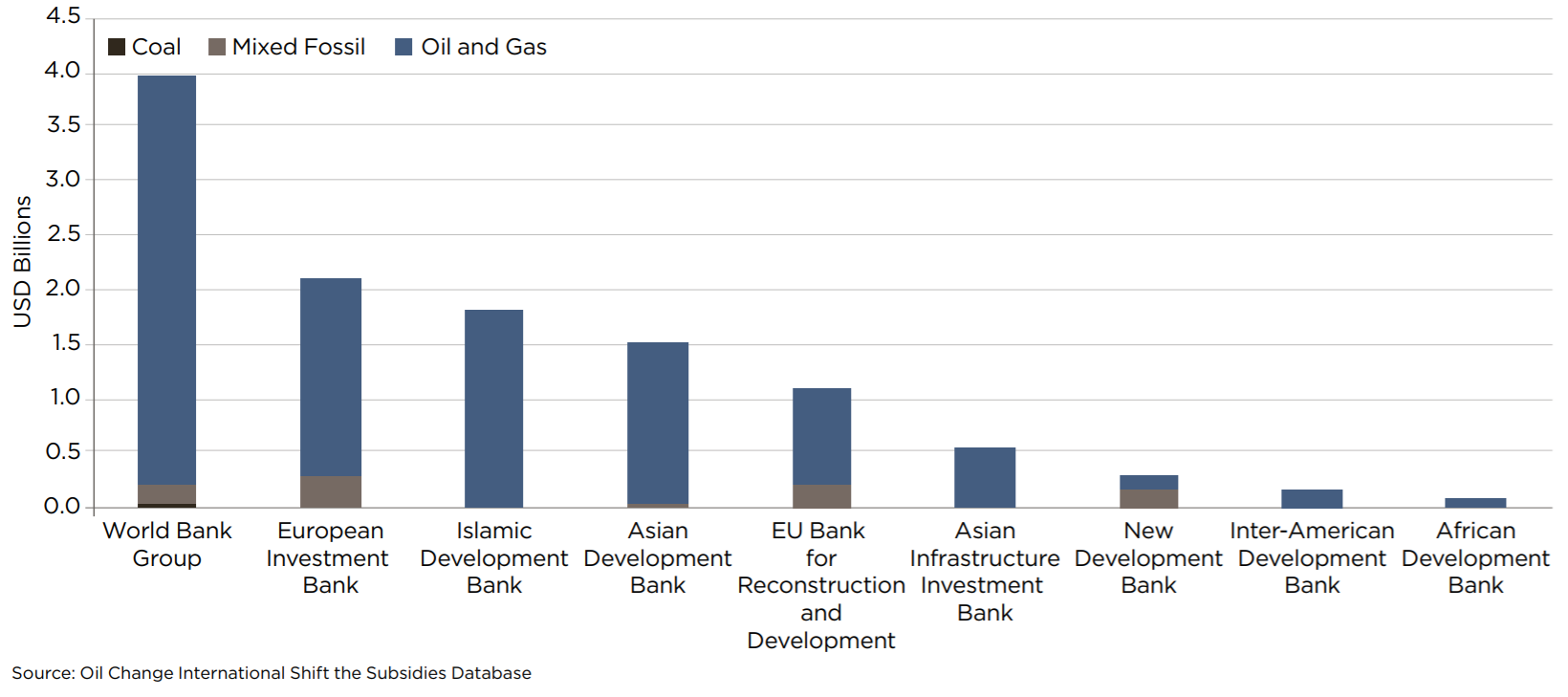For decades, wealthy countries and private companies have been using international aid, export credit support, and other foreign assistance – grants, loans, equity, and loan guarantees – to subsidize the expansion of the global fossil fuel industry.
For more than a decade, Oil Change International has been tracking these public financial flows to fossil fuels. Our Shift the Subsidies Database of energy finance from international, regional, and bilateral public financial institutions around the world now includes over 12,000 energy finance transactions going back to 2008.
International financial institutions such as the World Bank Group and regional development banks, along with export credit agencies and bilateral aid agencies, provide tens of billions of dollars each year in direct financial support to oil, gas, and coal companies to expand production globally. This dirty energy infrastructure causes local pollution, relocation of communities, and contributes to climate change – which is already hitting developing countries and the poor hardest. Even worse, it rarely supports increased access to energy for the poor, despite this being a common excuse used by politicians when asked about their funding of dirty energy.
As the threat of climate change increases and recognition of the benefits of basic energy services for the world’s poorest grows, some aid money and even some money from export credit agencies has begun to shift toward cleaner modes of energy production. Increasing access to energy for the world’s poorest people is also a slowly growing priority. But a great deal of public money – more than 77 billion a year from 2016-2018 – continues to flow to large-scale fossil fuel development, including oil, gas, and coal exploration projects that seek to add new reserves to the world’s fossil fuel resources. This is despite the fact that carbon dioxide emissions from burning the oil, gas, and coal in already-operating fields and mines globally would push the world far beyond 1.5°C of warming and would exhaust even a 2°C carbon budget.
This database is designed to provide information on the quantity, sources, and types of energy finance, that can then be used to encourage development banks and other public finance institutions to “Shift the Subsidies” from fossil energy to clean.
The Shift the Subsidies database currently tracks energy financing for projects, policies, technical assistance, and financial intermediary projects – where possible – that are supported by:
- Major Multilateral Development Banks, with data from 2008 to 2020.
- Bilateral Financing Agencies of the United States, with data from 2008 to 2020.
- Bilateral Financing Agencies of other G20 countries, with data from 2013 to 2020.
Shift the Subsidies Methodology
Each project in the Shift the Subsidies database is classified by energy source (each of which is labeled “Fossil Fuel,” “Clean,” or “Other”), and evaluated individually for whether it specifically targets energy access for the poor. Additional information on the data collected and the classifications of information in the database is available on our Shift the Subsidies Methodology page.
Analysis
For analysis on G20 public finance and Multilateral Development Bank finance for fossil fuels, read Oil Change International and Friends of the Earth U.S’s 2020 report: Still Digging: G20 Governments Continue to Finance the Climate Crisis
Top 12 G20 countries’ total fossil fuel public finance and fossil fuel finance per capita, annual average 2016-2018, USD billions*

Fossil fuel finance from MDBs, annual average 2016-2018

For further background information on MDB financing of fossil fuels, read Oil Change International’s 2017 briefing: Fossil Fuel Finance at the Multilateral Development Banks
For background information on G20 public finance for fossil fuels, read Oil Change International, Friends of the Earth U.S., Sierra Club, and WWF’s 2017 report: Talk is Cheap: How G20 Governments Are Financing Climate Disaster
For background on G20 fossil fuel subsidies, including public finance, read Oil Change International and Overseas Development Institute’s report: Empty Promises: G20 Subsidies to Oil, Gas, and Coal Production
